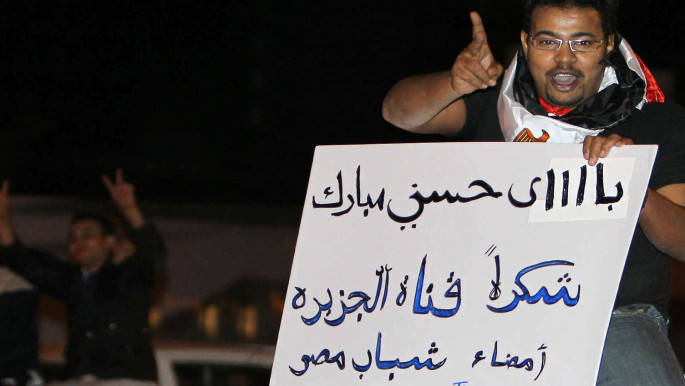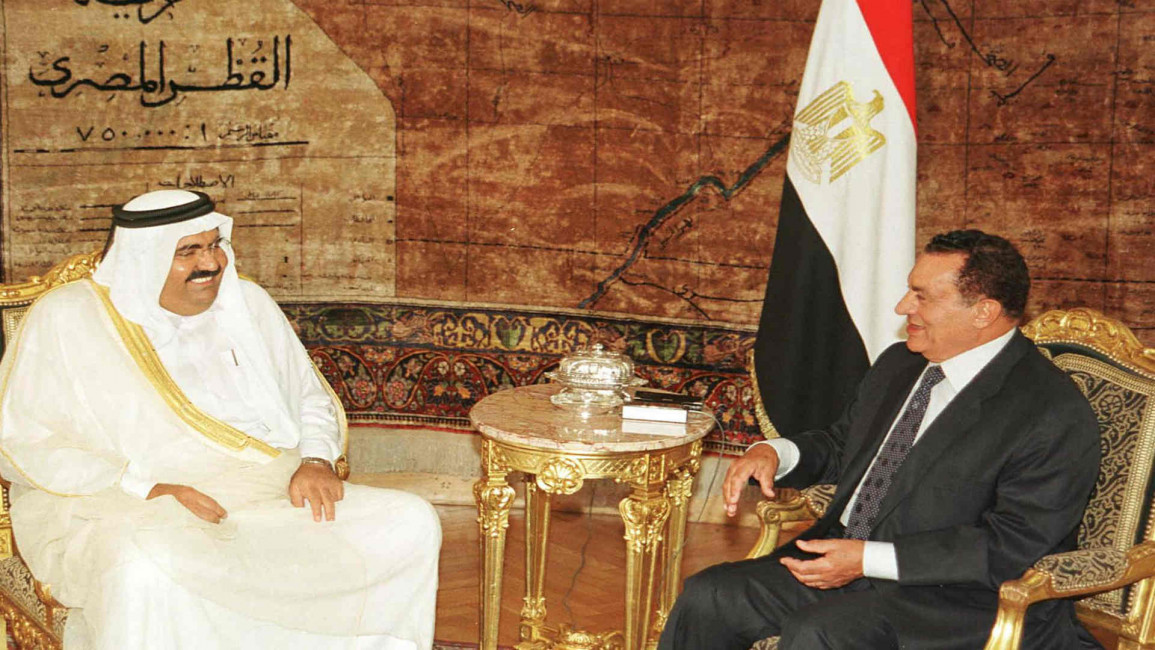
Cairo 'abandons' Egyptians in Qatar
"I ask her: 'how can you live in Qatar and love Sisi?' She used to say that the two things were not connected."
But now, after the blockade and Egypt's attempts to isolate Qatar?
"She thinks Sisi is gambling with our livelihood.
"He doesn't care about us - his minister says that we have the option to come home and we will find jobs; people already living in Egypt can't find jobs, what a joke!"
Unlike the other four countries blockading Qatar, Egypt has not recalled its citizens - effectively imposing a blockade on its own people. The action collectively punishes them for the crime of living in Qatar.
 |
I heard stories about Egyptians getting harassed, getting called traitors, after Egypt signed the peace agreement with Israel |  |
Uncomfortable and confusing
Seeing President Sisi, along with the entire Egyptian delegation, walk out of the hall during the Qatari emir's address to the Arab League earlier this year was like watching a Hollywood high school film about teenage rivalries.
Yet it stops being funny when one remembers that more than 200,000 Egyptians live in Qatar - official population 2.2 million. In 2006, Qatar's population was just shy of a million people and there were nearly as many Egyptians living in Qatar as Qataris.
The realities of being Egyptian in Qatar amid such political turbulence have proven a challenge.
"It gets difficult sometimes," Farah recalled.
"Facing Qataris after an Egyptian media rampage [against Qatar] is very uncomfortable and confusing.
"I understand Qataris getting angry - but it's not my fault, even though I am Egyptian."
Game of thorns
The Egyptian regime has long considered Qatar a thorn in its side. Egyptian dissidents were given a platform on the Doha-based Al Jazeera TV and Egypt's ousted President Hosni Mubarak went as far as to describe the network as "a matchbox" three years after its founding.
 |
|
| (Translation: Goodye Mubarak Thank you Al Jazeera) Egyptians in Qatar celebrate Mubarak's downfall [Getty] |
Egyptian media has frequently responded by exaggerating news surrounding Cairo's fraught relations with Qatar.
But in a bizarre twist of events for a president who disliked the country so much, Qatar ultimately became the last country to officially host Mubarak before he was deposed from power in the 2011 popular revolution.
Tiran and Sanafir
During Mohamed Morsi's short-lived tenure in Egypt's top job, he was accused of planning to sell Egyptian land (in Sinai) to Qatar in a bizzaro four-way deal with Hamas and Israel.
Of course, the only president who actually has divested Egypt of its land is the media darling Abdel Fattah El-Sisi.
In June, he handed over - reportedly with Israel's blessing - the strategically valuable islands, Tiran and Sanafir, to Saudi Arabia. Such an irony is sadly, but not surprisingly, lost on the Egyptian press.
Cairo's media was willing to go so far as to unload hostilities on countries it deemed too friendly with Qatar. Such was the case with Sudan when it received aid from Doha to resurrect the Marowe pyramids last April.
Continuously devolving relations
Farah recalled how her transition into adulthood in Qatar and national identity were defined by a political mayhem she never quite understood.
"It was like living in a bubble, no one left and not many new people came.
"It was a close-knit community. If you had asked me when I was a teenager where I was from I would have said 'Qatar' without hesitating."
Egyptians were among the first to migrate to Qatar after its independence from Britain in 1971. Farah's parents came to the country as newly qualified professionals in the early 1980s.
But the relationship between Qatar and Egypt was often fraught even during such a seemingly blissful era.
Qatar was among the majority of Arab countries to support Egypt's expulsion from the Arab League following the Camp David Accords. Egypt, meanwhile, boycotted the Middle East and North Africa Economical Summit in 1997 - because it was held in Qatar, a country it accused of funding Islamists even then.
Some 700 Egyptians living in Qatar lost their jobs and faced deportation as a result.
"I heard stories about Egyptians getting harassed, getting called traitors, after Egypt signed the peace agreement with Israel," said Farah.
"But things are not like that bad now, they don't take it out on citizens, most Qataris know that the Egyptian government is a different entity."
Summer coup
The Egyptian uprising in 2011 gave hope to Egyptians in Qatar - as it did many of their countrymen back home.
"After Mubarak stepped down, we celebrated - there was a big parade on the corniche and it wasn't only Egyptians. I never felt afraid to believe what I had believed in, even on June 30 [2013] we also celebrated.
"I thought the coup would be a good thing."
The Qatari emir did not share Farah's optimism towards the direction her country took in 2013.
In a sit-down at Georgetown University, Sheikh Tamim said: "We believe that what happened on June 30 was wrong, the way it happened; they could've had another early election."
Such opinions fuelled the Egyptian regime's hostility towards Qatar. Sisi's government also accused Qatar of harbouring members of the Muslim Brotherhood, which it considers to be a "terrorist" group. This led Egypt to withdraw its ambassador from Doha in 2014, leaving its own citizens without representation ever since.
In the recently leaked Riyadh Agreement signed by Sheikh Tamim and then Saudi King Abdullah in 2013, Egypt’s ally insisted that Doha based media outlets, mainly Al Jazeera, refrain from referring to the ousting of Morsi as a coup.
But surely, just because you don't call it a coup doesn't stop it from being a coup.
Follow Gehad Quisay on Twitter: @ghqsy_




